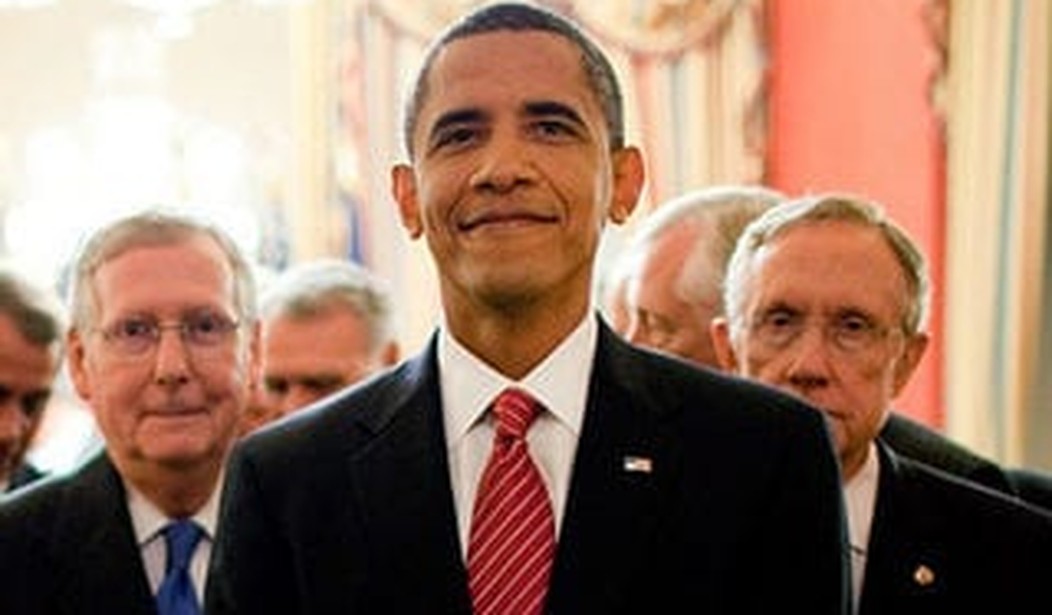WASHINGTON – President Obama was handed two competing Republican blueprints for dealing with the ongoing partial governmental shutdown and the nation’s debt ceiling deadline on Friday but refrained from granting his blessing to either package as talks among the competing sides continued.
Obama met with all 45 Senate Republicans at the White House where they discussed, among other things, a plan being floated by Sen. Susan Collins (R-Maine) that would reopen the partially closed federal government through passage of a stopgap spending measure and a short-term increase in the $16.7 trillion debt ceiling before it is breached on Oct. 17.
In return, a tax imposed by the Affordable Care Act on medical devices – which has attracted criticism from both Democrats and Republicans – would be repealed and federal agencies would be given more flexibility in managing across-the-board budget cuts known as sequestration, subject to congressional oversight.
No deal resulted from the meeting but the factions expressed optimism that they are on the road toward resolution.
“For a president who said he would not negotiate, today’s meeting was a step forward,” said Sen. Dan Coats (R-Ind.). “Both sides had the opportunity to present their viewpoints and it is important that we are at least talking. I will continue to work with my colleagues – in both the House and Senate – to find a solution so we can remove this uncertainty to focus on restoring our fiscal health and growing the economy.”
Following the two-hour White House get-together, Collins huddled with Sen. Joe Manchin (D-W.Va.) in an effort to pull together various proposals to create a potential bipartisan proposal acceptable to the White House. That package is expected to include provisions extending the federal government’s borrowing capacity to Feb. 1 along with a continuing resolution that will fund operations to April 1. Agencies would be provided with some flexibility in handling spending cuts and set the stage for House-Senate budget negotiations.
Senate Republican Leader Mitch McConnell, of Kentucky, asserted that “no one wants a default” that could result if the government is unable to borrow the funds needed to pay its bills.
“That’s why, in 50 years of negotiations over multiple debt ceiling increases, we haven’t had a single one,” McConnell said. “So let’s put this hysterical talk of default behind us and instead start talking about finding solutions. There are a variety of ways to get debt and spending under control, a lot of innovative reforms we could consider. But we’ve got to talk to each other to make it all happen.”
Meanwhile, House Republicans, who offered a framework for negotiations during a meeting with Obama on Thursday evening, were busy revising their plan in an effort to make it more attractive to the White House. Under the new proposal, GOP lawmakers expressed a willingness to raise the debt ceiling for a six-week period and reopen government in return for some entitlement reforms.
But early indications are the effort proved futile and the president is more amenable to the Senate framework. Jay Carney, the White House press secretary, said Obama appreciates “the constructive nature of the conversation” he had with House GOP leaders but “he has some concerns with it.”
“A proposal that puts a debt-ceiling increase at only six weeks, tied to budget negotiations, would put us right back where we are today in just six weeks, on the verge of Thanksgiving and the obviously important shopping season leading up to the holidays,” Carney said. “And that would create enormous uncertainty for our economy.”
Obama expressed his misgivings to House Speaker John Boehner (R-Ohio) in a phone conversation.
“What we think is not the right way to go is to try again to link extension of the debt ceiling to budget negotiations, and therefore link the possibility of default to whether one side gets what it wants in those negotiations,” Carney said.
A substantial portion of the federal government has been closed for 11 days, originally as a dispute between the president and House Republicans over the Affordable Care Act, also known as Obamacare, which requires, among other things, that all Americans obtain health insurance.
The GOP leadership initially acted to pass a temporary spending plan funding the federal government beyond Sept. 30, the end of the federal fiscal year. In exchange, the caucus demanded Obamacare’s defunding.
Neither Obama nor Senate Democratic Leader Harry Reid, of Nevada, would go along with the ultimatum resulting in an impasse, forcing a partial shutdown that continues. Democrats have insisted that lawmakers adopt a continuing resolution.
Republicans changed their demands several times, asking at one point that Obamacare’s implementation be postponed for a year. None of the proposals gained White House approval.
The House also has balked at approving an increase in the debt ceiling without White House concessions. Treasury Secretary Jack Lew has warned lawmakers that failing to raise the debt ceiling by Oct. 17 would leave the government without borrowing authority, meaning it would not be able to meet its financial obligations.
While opposition to Obamacare sparked the government shutdown it has barely been mentioned in recent talks to the chagrin of conservative lawmakers who keep the healthcare law in their crosshairs and could scuttle any deal.
Speaking Friday at the 8th annual Values Voter Summit, a collection of social conservatives gathered in Washington, Rep. Michele Bachmann (R-Minn.) insisted that “this egregious system, that will ultimately be known as ‘Deathcare’ must be defeated,” maintaining that congressional conservatives must demand that Obama “allow Obamacare to be voluntary for every American.”
“When the federal government controls your healthcare they literally control life and death,” Bachmann said.
Sen. Mike Lee (R-Utah), who has led the fight against Obamacare in the upper chamber with Sen. Ted Cruz (R-Texas), told summit attendees that “the very best argument against Obamacare is the president’s conduct during the first 10 days of this shutdown.”
“I mean, look what’s happened,” he said. “The president is using the immense power of the federal government to hurt the American people. Why? In order to win a political argument. What happens then when we turn over some of the most private, intimate decisions in our lives, our healthcare system, to the government? When will that be used as a tool against us? We must stop it, we must defund it, we cannot accept it.”









Join the conversation as a VIP Member